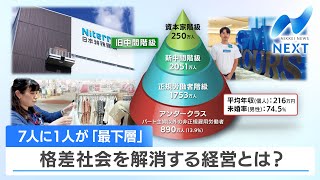Waseda University Professor Hashimoto of the Faculty of Human Sciences has categorized modern Japanese society into five classes, identifying non-regular workers (excluding part-time housewives) as the underclass. This group numbers approximately 8.9 million people, representing roughly one in seven of the employed population.
The average annual income for this underclass is around 2 million yen. Moreover, more than 70% of men in this group remain unmarried, as they struggle to support household formation and child-rearing.
One of the key factors driving the rise of this underclass is corporate labor practices. From fiscal 2014 to 2024, Japanese companies have significantly increased retained earnings; however, wages have remained largely flat. Over the past two decades, non-regular employees have earned only 60% to 70% of the wages of regular employees, with little indication that this gap is narrowing.
The expansion of lower-paid non-regular positions has entrenched economic insecurity. This insecurity discourages consumption and child-rearing, while also fueling educational disparities that could undermine Japan’s competitiveness and long-term economic growth.
To address these issues and close the divides, companies are being urged to adopt inclusive management practices that leave no one behind. Improving conditions for non-regular workers is essential. Equally important is strengthening the potential of mid-career hires from the so-called “employment ice age” generation, as well as senior workers.
Some companies have already begun making positive changes:
– **Aeon Retail** has introduced new leadership positions for non-regular staff, offering bonuses, regional allowances, and retirement benefits equivalent to full-time employees on an hourly basis.
– **Security firm ALSOK Saitama** has raised the maximum hiring age for full-time employees to 59, thus creating opportunities for older workers.
– **At NGK Insulators**, senior employees’ wages are now tied to clear performance standards, enabling them to earn pay levels on par with active managers.
These efforts highlight a growing recognition of the need for inclusive employment practices to build a more equitable and sustainable workforce in Japan.
https://newsonjapan.com/article/147033.php



